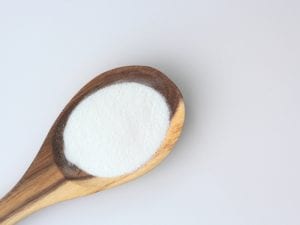Taking a supplement known as inositol has been shown to have promising results in improving symptoms and infertility with women who suffer from polycystic ovary syndrome, PCOS. This has been found to be especially the case when combined with a daily dose of folic acid.
What is Inositol ?
Inositol, also known as myo-inositol or vitamin B8, is not truly a vitamin, but rather a type of sugar. This sugar has quite a few important functions. It plays a structural role within your body as it is a major part of cell membranes. This influences the body’s action of insulin, which is used to control blood sugar. Inositol affects the chemical messengers in your brain like dopamine and serotonin.
Where to Find It
Within your daily diet inositol can be found within grains, beans, nuts, fresh fruits, and fresh vegetables. It is estimated that through diet the average person would consume about 1 gram of inositol a day.
However, you can also take a supplement in order to receive higher doses. Research has shown there are benefits to taking up to 18 grams per day.
Quick Overview of PCOS
Polycystic ovary syndrome, PCOS, is a hormonal endocrine disorder that affects women. Estrogen and progesterone hormone levels are not balanced. This imbalance causes the growth of ovarian cysts and even enlarged ovaries. Women who suffer from PCOS may also notice issues within their thyroid, insulin levels, adrenal function, and the pancreas. Many women who suffer from PCOS, also suffer from fertility issues. The hormone imbalance of PCOS tends to disrupt the ovulation cycle within the body.
How Inositol Can Help with PCOS

Insulin can make the ovaries very sensitive, especially when it is immune to insulin resistance. When insulin is increased granulosa cell sensitivity to the luteinizing hormone (LH) then ovarian androgen production increases. These ovarian theca cells within women who have PCOS become more efficient at testosterone production. Insulin levels that are high can also impede with ovulation, usually through the inositol pathway.
Improvement Within IVF Protocols
Women with PCOS also tend to suffer from poor quality oocytes, eggs. A study was done on women undergoing IVF due to PCOS and the effects of myo-inositol on their egg quality. The study concluded that the women who were not taking myo-inositol did produce more eggs from their IVF cycle, however the quality of the eggs and embryos were far greater in the women who did take the myo-inositol. Showing that there does seem to be some connection between the myo-inositol and an improvement within the oocyte quality for women with PCOS. The study showed no moderate to severe side effects were observed from the group taking myo-inositol, however they did notice that because there were less eggs retrieved from this group there may be less of a risk of hyperstimulation syndrome within these patients as well. Overall, it was found that myo-inositol represents an improvement within IVF protocols for women with PCOS.
Inositol for Overall Fertility
Research has shown that inositol can help to regulate a number of cellular functions within the body. This can help to promote balanced hormone levels as well as to improve overall ovulation. The effect that it holds on insulin alone can help to improve ovulation. It has also been shown to help with body weight and obesity to provide patients optimized ovarian activity. Myo-inositol will help to improve egg quality and can help to reduce enlarged ovaries.
Inositol Combined with Folic Acid
The best results for women with PCOS that take myo-inositol are found to be in conjunction with folic acid. Clinical studies suggest that daily doses of both folic acid and inositol can help to reduce levels of triglycerides within the blood. This can help to improve overall insulin function and to lower blood pressure within women with PCOS.
This combination can also promote a healthier ovulation within women, which is something many women with PCOS struggle with. A study of women who took four grams of inositol and 400 mcg of folic acid a day for three months induced ovulation within 62%.




